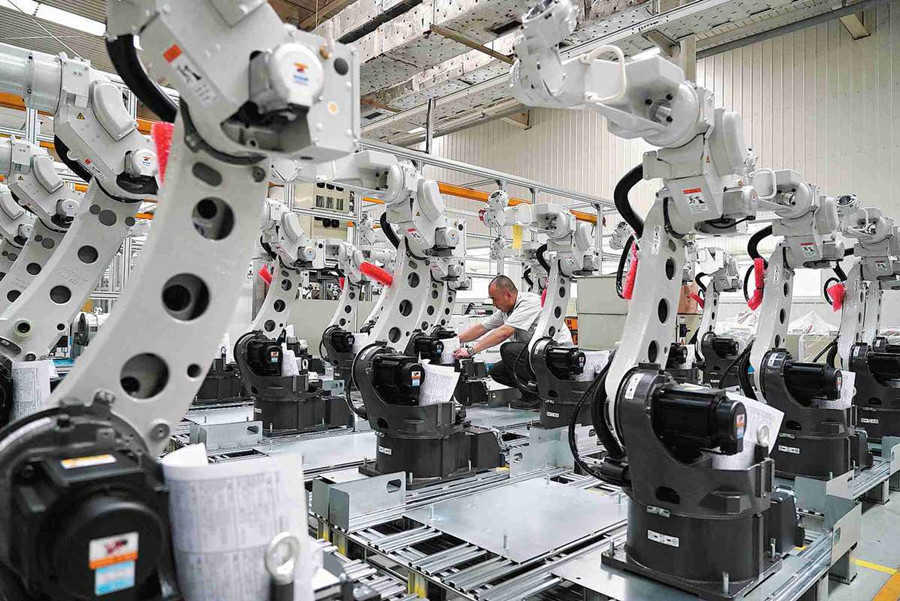Nation takes giant strides with innovation

An employee checks welding robots at a manufacturer in Tangshan, Hebei province. [Photo/Xinhua]
Remarkable progress
China has witnessed remarkable achievements in advancing development of the 5G telecommunications network and using next-generation wireless technology for the digitalization of different sectors.
As of the end of July, the nation had set up some 1.97 million 5G base stations, with all prefecture-level cities, counties and 96 percent of towns equipped with 5G network coverage, according to the MIIT.The number of 5G mobile users in China has reached 475 million.
Speaking at the 2022 World 5G Convention in Harbin, Heilongjiang province, in August, Zhang Yunming, vice-minister of industry and information technology, said efforts will be stepped up to advance the construction of 5G networks, encourage upstream and downstream enterprises in the 5G industrial chain to strengthen cooperation, and accelerate the large-scale application of 5G technology.
Zhang said China has entered a crucial period for 5G commercialization, with the superfast wireless technology being applied to 40 of the 97 major economic categories, and large-scale application expanded to mines and ports.
The China Academy of Information and Communications Technology, a government think tank, said the nation is likely to spend 1.2 trillion yuan on 5G network construction, which will drive more than 3.5 trillion yuan of investment in the upstream and downstream industrial chain and related sectors by 2025.
Wang Zhiqin, deputy head of the academy, said the 5G industry is expected to directly create more than 3 million jobs by 2025, with its information market resulting from the commercialization of the wireless technology surpassing 8.3 trillion yuan.
Xiang Ligang, director-general of the Information Consumption Alliance, a telecom industry association, said 5G technology is being applied in a wide range of industries and scenarios, including video conferencing, online medical consultations, remote education, short videos, livestreaming events and games.
China is also committed to promoting the application of 5G technology in the industrial internet, supporting initial public offerings of eligible industrial internet companies, and accelerating innovation of key technologies to advance enterprises' digital transformation, according to the MIIT.
To date, the nation has cultivated 150 large-scale industrial internet platforms, which are connected to more than 79 million units of industrial equipment.
Experts also stressed the importance of boosting self-reliance in core technologies and key fields, which is crucial to ensuring independent and controllable industrial and supply chains.
Wang Yiming, vice-chairman of the China Center for International Economic Exchanges, said that against the backdrop of an increasingly complicated and grim external environment, technological innovation is not only a matter of development, but also of survival.
"Only by pursuing self-reliance in core technologies and key fields can we break the monopoly of some countries in high-tech sectors," Wang said.
China has made great strides in boosting advances in technologies, but it is still reliant on developed countries for key and core technologies such as high-end chips, aircraft engines, core robotic components and premium medical equipment, Wang added.
He called for heightened efforts to strengthen the nation's independent innovation capacities, achieve breakthroughs in resolving bottleneck problems, and increase investment in basic research and strategic forward-looking technologies.
Chen Duan, director of the Digital Economy Integration Innovation Development Center at Central University of Finance and Economics, said more should be done to give full play to the advantages of a unified domestic market that is highly efficient, rule-based, and fair and open to competition.
"We should expedite the translation and application of key scientific and technological breakthroughs, and support leading high-tech companies to pour more money into state-of-the-art technologies to better serve the country's development strategy," Chen said.
Enterprises, as key players in technological innovation, are expected to play a positive role in promoting the effective allocation of resources, Chen added.
Copyright © The National Committee of the Chinese People's Political Consultative Conference.
All rights reserved. Presented by China Daily.
京ICP备08100501号-1

